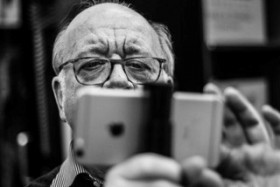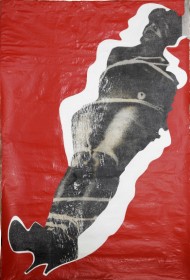A Guest Entry by Rudij Bergmann
Accompanying our current exhibition, “No Compromises! The Art of Boris Lurie,” Rudij Bergmann’s film about the artist will premiere on 21 March 2016 (additional information available on our event calendar). In this guest entry, the filmmaker tells us how this very personal documentary came about.

Rudij Bergmann in the Boris Lurie Art Foundation warehouse in New York
Photo: Benjamin Donath
The artist’s longing for Europe was palpable from the moment I first saw him in the dim light of an apartment hallway on New York’s 66th Street. Stepping into his home studio, confronted by this breathtaking collage of memory, it was immediately clear to me that Boris Lurie hadn’t fully left the concentration camps he survived with his father – at least mentally.
It was October 1996. A film for the television magazine BERGMANNsART, which I’m for all intents and purposes responsible for, was the reason to rush to see Lurie in New York. (The film, in German and with age restriction, is available on YouTube.)
It was the beginning of a long friendship. Many trips and visits followed, as well as conversation, faxes, and discussions on articles. A new and more comprehensive film was conceived. In his last years, Boris was often sick, until his eventual death in 2008 – an inconvenience, you could tragically muse.
The Fluxus and Happening artist, Wolf Vostell, brought Lurie’s unsettling artwork to my attention in 1995: he’d made the beautiful and the naked, the gassed and the escaped, into his own, if not singular, artistic theme. Always on the cutting edge, balancing in a minefield of voyeuristic lust and pure horror – in both art and life, Lurie gave into neither.
In honor and memory of Borie Lurie and Wolf Vostell, I’ve incorporated three of Vostell’s Fluxus music miniatures into my new Boris film in unplanned, nearly anarchic and very last-minute fashion.
The Art of Boris Lurie by Rudij Bergmann – Trailer; Boris Lurie Art Foundation NYC, USA & BERGMANNsArt, Mannheim, Germany
Thanks to and on behalf of the Boris Lurie Art Foundation as well as its director, Gertrude Stein – Boris’s gallerist and closest confidante – I can at last present the nearly hour-long film, The Art of Boris Lurie, on DVD, 20 years since making the short film in Manhattan.
The film was first shot in New York in 1996, and concluded in February 2016 at the Jewish Museum Berlin. Various time periods and situations, before and after the artist’s death. Multiple camera operators. Differing materials and, as inclination and necessity dictated, shooting with my DRC – the director’s camera, a “kitted out” iPhone. All these conflicting formats bring together a unified look at Boris Lurie and his art. Their authenticity is left intentionally untouched.
The Art of Boris Lurie complements the 2016 exhibit at the Jewish Museum Berlin, but it is also strongly influenced by my own view of Lurie’s work – and our encounters, the last few months before his death in New York.

Boris Lurie’s, “Love Series: Bound on Red Background,” from 1962 also plays a role in Rudij Bergmann’s Lurie film; Boris Lurie Art Foundation, New York, USA
My interview partners in the film are Program Director Cilly Kugelmann as well as Helmuth F. Braun, exhibit curator at the Jewish Museum Berlin; Peter Weibel, director of the Center of Art and Media in Karlsruhe, and well-known Boris Lurie fan; the New York conservator, Ronald Morosan; the American avant-garde filmmaker and friend of Lurie, Aldo Tambellini; and, of course, Gertrude Stein, and Boris Lurie himself.
My film sees itself as a dialogue between all participants – the living and the dead. In the process of conversation and debate, I didn’t want to resist the temptation to stray from the preferred interpretations of Boris’s work – as I was keen to do in, for example, my film, Der Leonardo-Code – Vom Leben und Wirken des geheimnisvollen Mannes aus Vinci (The Leonardo Code – from the Life and Work of the Mysterious Man from Vinci). I’m convinced that controversial viewpoints – in contrast to arbitrary opinions – are what drive the discourse about art and artists forward.
Moreover, both in film and in general we are only at the beginning of comprehending the artistic depth and complexity of Boris Lurie’s work, without which we’d be unable to understand the artist’s life …
Rudij Bergmann was born in Bad Godesberg in 1943. The filmmaker, author and critic lives in Mannheim and is vice president of the Freie Akademie der Künste Rhein-Neckar as well as member of the International Association of Art Critics. He’s known for his television program, BERGMANNsART. He produces series for the German-French television channel, ARTE, such as Die großen Surrealisten (The Great Surrealists) and Nackt ist die Kunst (Naked is the Art), as well as documentaries about Édouard Manet, Wolf Vostell, and Neo Rauch, and the film, Der Leonardo-Code.